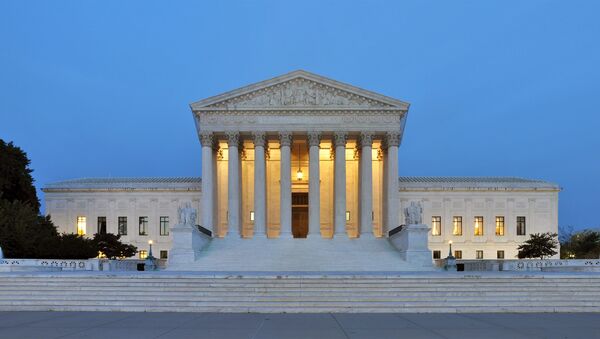On Monday, the US Supreme Court heard oral arguments in the case of United States v. Texas, a challenge by the state of Texas and 26 other US states, against President Obama’s executive orders granting deferred action to up to 5 million undocumented immigrants.
Under the executive orders, signed November 20, 2014, undocumented immigrants who are parents of US citizens or who immigrated to the US under the age of 16, and maintained residency in the country, would be relieved of the threat of deportation and granted social security numbers, making them eligible for driver’s licenses and work permits.
At issue in the case is whether the president exceeded his authority by issuing the executive orders.
The states allege that the executive orders grant individuals a new legal status, forcing states to bear the cost of processing the new status and providing benefits.
The administration argues that immigrants receiving deferred status are not receiving additional legal privilege, but are merely being notified by the US government that, in the exercise of executive branch discretion, they will not be targeted for deportation because they are a lower priority and the United States lacks the resources to target the entire 11 million population of undocumented immigrants.
The federal district court that first heard the case ruled in favor of the states, enjoining President Obama’s executive actions as unconstitutional. On appeal, the case went to the Fifth Circuit Court, which upheld the lower court ruling. The US Supreme Court will now decide whether to uphold those rulings.
On Tuesday, Loud & Clear’s Brian Becker sat down with immigration attorneys Alan Diamante and Zachary Wolfe to discuss the likely outcome of the case and whether the almost five million undocumented immigrants impacted by the executive order will be granted relief from deportation.
What is the impact of this case?
"On November 20, 2014, President Obama issued an executive order expanding the deferred action programs, DAPA and DACA, to grant relief from deportation to over 5 million undocumented immigrants,” explained Diamante. “DAPA applies to immigrant parents of US citizens and DACA applies to childhood arrivals."
The decision, Diamante explained, expanded the qualifications of these deferred action programs, first instituted in 2012, so that a larger portion of the US undocumented immigrant population would qualify.
"These are individuals who have not committed crimes and have been living in the US continuously since 2010," said Diamante. "These individuals don’t have other disqualifying factors, such as affiliation with a gang, and so these are people who the Obama administration does not believe are a priority to deport."
Do you think the court will rule in favor of the Obama Administration?
"It is tough to determine where the court will come down," argued Wolfe. "The main issue is what happens when an individual is told they are given deferred action – does that have the effect of putting them into a new status?"
"There is a longstanding tradition that the executive branch gets to decide priorities on how it is going to carry out its law enforcement functions," explained Wolfe, "and there are more than 11 million people who can potentially be deported but not enough resources to do it."
"There is no question about whether the executive branch has discretion to prioritize who to target for deportation, but the question is whether a formal statement granting an individual deferred action and stating that they are lawfully present has the effect of granting them extra rights," said Wolfe. "It is a tough question."





